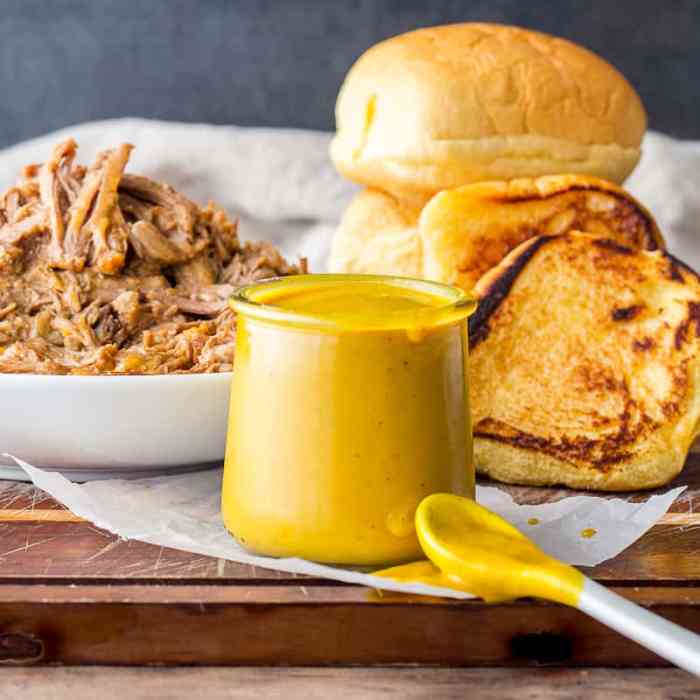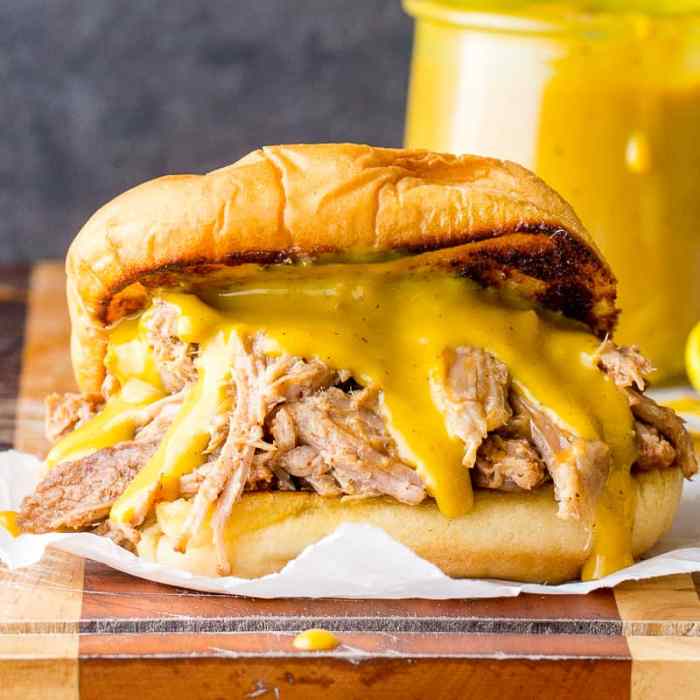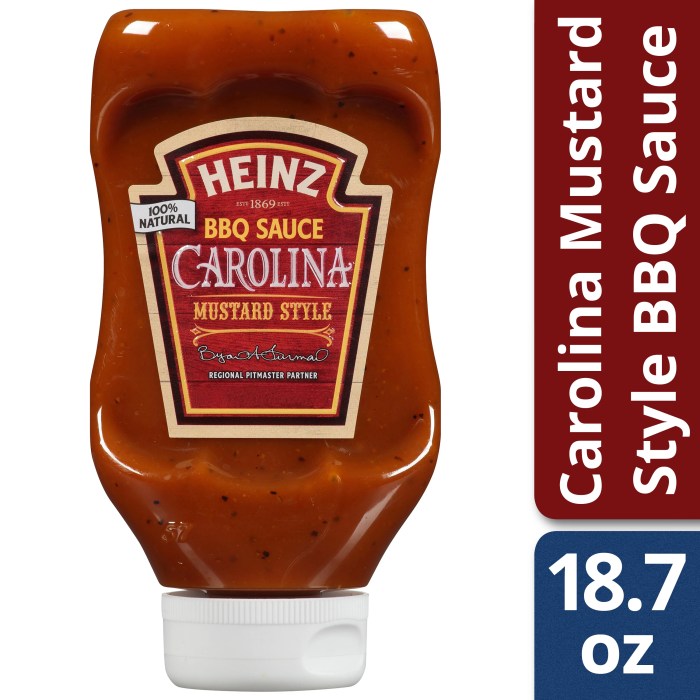Carolina BBQ Mustard Sauce Recipe
Carolina BBQ Mustard Sauce: A Deep Dive: Carolina Bbq Mustard Sauce Recipe
Carolina bbq mustard sauce recipe – Carolina barbecue, renowned for its vinegar-based sauces, boasts a fascinating sub-category: the mustard-based sauce. This tangy, spicy, and subtly sweet condiment adds a unique dimension to the already diverse world of barbecue. This article explores the history, key ingredients, recipe variations, cooking suggestions, and the sensory experience of this distinctive sauce.
History and Origins of Carolina BBQ Mustard Sauce

Source: basilandbubbly.com
The exact origins of Carolina mustard-based BBQ sauce remain somewhat shrouded in mystery, but its development is deeply intertwined with the culinary traditions of the Carolinas, particularly South Carolina. Unlike the tomato-based sauces prevalent in other regions, the preference for vinegar and mustard reflects the readily available ingredients and the distinct palate of the area. Regional variations are significant, with the specific blend of mustard, vinegar, and spices differing across counties and even families.
While precise dates are elusive, the style likely emerged sometime during the 19th or early 20th century, evolving alongside the broader barbecue traditions of the region. Compared to other regional styles like Kansas City’s tomato-based or Texas’s smoky sauces, Carolina mustard-based BBQ sauce stands apart with its sharp vinegar tang and the distinctive bite of mustard. A timeline might show an initial period of simpler recipes using locally sourced ingredients, followed by gradual refinement and the incorporation of new spices as trade routes improved.
Key Ingredients and Their Roles

Source: basilandbubbly.com
The success of Carolina BBQ mustard sauce hinges on the careful balance of its key components. Each ingredient contributes a unique facet to the overall flavor profile. The choice of mustard significantly impacts the final product, with different types offering varying degrees of pungency and sweetness. The vinegar provides acidity, cutting through the richness of the meat and adding a refreshing sharpness.
Sugar balances the acidity, while spices add depth and complexity.
| Mustard Type | Flavor Profile | Acidity | Suggested Use |
|---|---|---|---|
| Yellow Mustard | Tangy, slightly sweet | Medium | Base for milder sauces |
| Stone-ground Mustard | Earthy, robust, slightly bitter | High | Adds complexity to spicier sauces |
| Dijon Mustard | Sharp, tangy, slightly spicy | High | Adds a sophisticated kick |
| Brown Mustard | Savory, slightly sweet and smoky | Medium | Adds depth and a unique flavor |
Apple cider vinegar is a common choice, lending a fruity sweetness, but white wine vinegar offers a crisper, more acidic profile. Substitutions might include honey for sugar, or Worcestershire sauce for a deeper umami flavor.
Recipe Variations and Adaptations
The beauty of Carolina BBQ mustard sauce lies in its adaptability. Numerous variations exist, each reflecting the unique preferences of its creator. Here are three distinct recipes, showcasing variations in spice and sweetness:
- Mild Mustard Sauce: Yellow mustard, apple cider vinegar, brown sugar, paprika, and a touch of garlic powder.
- Spicy Mustard Sauce: Stone-ground mustard, white wine vinegar, honey, cayenne pepper, black pepper, and a pinch of celery seed.
- Sweet and Tangy Mustard Sauce: Dijon mustard, apple cider vinegar, brown sugar, turmeric, onion powder, and a dash of smoked paprika.
A vegan version can easily be created by substituting honey with agave nectar or maple syrup. To achieve a thicker consistency, simply simmer the sauce for a longer period. For a thinner sauce, add a bit more vinegar or water.
Cooking and Serving Suggestions
The sauce is best prepared on the stovetop, simmered gently until the flavors meld. Optimal cooking time is around 15-20 minutes, allowing the flavors to deepen. Store the sauce in an airtight container in the refrigerator for up to two weeks. The ideal consistency should be smooth and pourable, not too thick or thin. The color will vary depending on the ingredients, ranging from a pale yellow to a deep amber.
Serve generously over pulled pork, chicken, or even grilled vegetables. Pair with classic sides like coleslaw, potato salad, or hushpuppies for a complete Carolina BBQ experience.
Flavor Profiles and Sensory Experience, Carolina bbq mustard sauce recipe

Source: walmartimages.com
A well-made Carolina BBQ mustard sauce offers a complex interplay of flavors. The dominant notes are tangy vinegar, pungent mustard, and a balancing sweetness. The spiciness varies depending on the recipe, but it’s typically a subtle heat rather than an overwhelming burn. The aroma is a delightful blend of vinegar, spices, and mustard, while the texture is smooth and slightly viscous.
Compared to other BBQ sauces, it lacks the smokiness of Texas-style or the sweetness of Kansas City-style, instead showcasing a unique balance of sharp and sweet.
Key Questions Answered
Can I make this sauce ahead of time?
Yes, Carolina BBQ mustard sauce can be made ahead of time. Store it in an airtight container in the refrigerator for up to a week. The flavors will meld and deepen over time.
What meats pair best with this sauce?
This sauce is fantastic on pulled pork, chicken, and even grilled vegetables. Its tangy flavor cuts through the richness of the meat.
How can I thicken the sauce?
To thicken the sauce, simmer it uncovered for a longer period, allowing excess liquid to evaporate. Alternatively, you can whisk in a small amount of cornstarch slurry (cornstarch mixed with cold water).
What if I don’t have apple cider vinegar?
White vinegar or even white wine vinegar can be substituted for apple cider vinegar. The flavor profile will be slightly different, but still delicious.





















